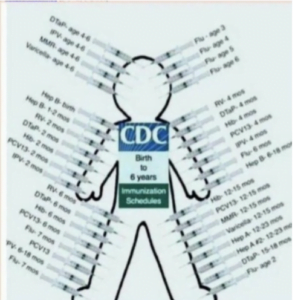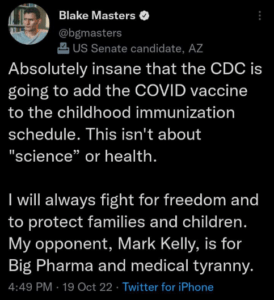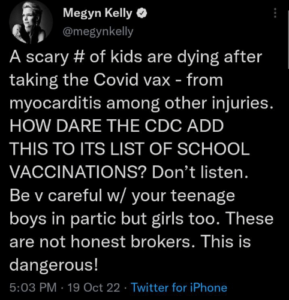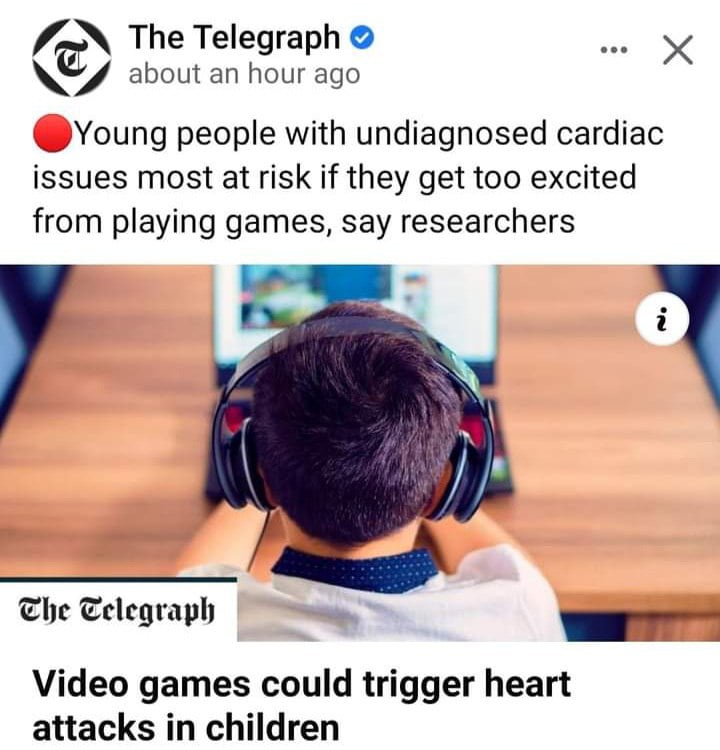The world is experiencing cardiac arrests and sudden deaths in young and healthy people. This is not a “rare phenomenon” and now it is even becoming common in young children. How do we know? We can start by analysing an article in which once again the media starts giving you the spoon before the feed.
And as we have seen it already doing it starts preparing the readers by coming up with ridiculous articles and reasons citing ridiculous “peer-reviewed scientific” studies. At least 50% of these so-called peer reviewed journals have undeclared conflicting interests because Big Pharma heavily funds them to carry out biased studies or to skew data or to misrepresent it to the medical profession. It shows at which fake stage research and science is.
According to the Telegraph and other media portals “Video games could trigger heart attacks in children”.[1]Citing research conducted from the Heart Centre for Children in Sydney Australia the link has been found after collecting data from several studies.
Dr Claire Lawley the study’s lead investigator explained: “Video gamesmay represent a serious risk to some children with arrhythmic conditions. They might be lethal in patients with predisposing but often previously unrecognised arrhythmic conditions.”
“Children who suddenly lose consciousness while electronic gaming should be assessed by a heart specialist as this could be the first sign of a serious heart problem.”
Is this implying that children are suddenly losing consciousness while playing video games at homes? Were these children vaccinated with Covid-19 vaccines? Apparently yes because the study’s co-author Christian Turner said: “We already know that some children have heart conditionsthat can put them at risk when playing competitive sports but we were shocked to discover that some patients were having life-threatening blackouts during video gaming.”
He added: “Video gaming was something I previously thought would be an alternative ‘safe activity’. This is a really important discovery. We need to ensure everyone knows how important it is to get checked out when someone has had a blacking-out episode in these circumstances.”
The reason the researchers gave is that the rush of adrenaline that children get from playing high-octane games activated the dormant underlying heart condition because according to the same researchers vulnerable children are especially vulnerable to cardiac episodes during times of maximum emotional investment such as after a win or loss.
It is a normal reaction for the body to have a rush of adrenaline in contexts when this is needed.
Scientists now recommend that any child who has a history of blacking out while gaming is evaluated for potential heart problems as this can be an early warning sign.
It is better if they recommend that children should stop getting vaccinated considering that the CDC advisors voted to include COVID-19 shots in the recommended immunization schedule for adults and children though this will not result in school mandates unless states act.[2]
On Thursday 20thOctober the unelected advisory committee on immunization practices unanimously agreed via voting that Americans 6 months and older should receive the vaccines as well as boosters if they are eligible. This vote sparked a debate about whether schools will begin to require COVID-19 shots for students.
This means that Covid-19 mRNA shots will be recommended as part of the childhood vaccine schedule in the United States. The committee’s decision will be consequential as it will be a boon to the pharmaceutical companies seeking liability protection for their mRNA shots.

And Dr. Jonathan Skinner the co-author of the study cited in The Daily Telegraph said he was “staggered” to see how widespread the issue is and that it has led to some children dying.
This means that the world is witnessing the sudden deaths of children dying of cardiac arrest.


[1]https://www.telegraph.co.uk/news/2022/10/11/video-games-could-trigger-heart-attacks-children/
[2]https://www.washingtontimes.com/news/2022/oct/21/cdc-recommends-covid-19-shots-for-kids-and-adults-/

